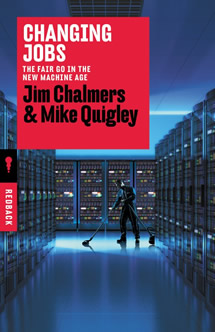Reviewed by Rama Gaind.
By Jim Chalmers & Mike Quigley, Redback, $22.99.
 “There is a tremendous upside to technological change. It has the potential to improve lives and wellbeing, save time and effort and help combat, if not overcome, so many of the obstacles to a good life in a thriving society.”
“There is a tremendous upside to technological change. It has the potential to improve lives and wellbeing, save time and effort and help combat, if not overcome, so many of the obstacles to a good life in a thriving society.”
The authors – one a technologist and former chief executive officer with a telecommunications background, the other a politician with experience in economic policy and a PhD in political science – make a solid case for recognising and acting on fears to ensure technology benefits people.
Mainly this book is about technology and the changing face of work. Also, it’s about the best way to approach this change to advance the fair go in the new machine age – at both a personal and a political level.
Quigley and Chalmers say the rapid growth in artificial intelligence, robotics, automation and machine learning are also worrying Australian families. It looks at a disruptive effect of automation, the labour force inequality and what Australia should do. Technology can powerfully improve people’s lives, but of concern are rising trends in disparity and employment insecurity.
You might not just lose your job to new technical hardware, you could miss out on the technological dividend that will be prosperous for some. Advantages will not flow to everyone unless there’s control.
While recognising technology and its impact on jobs in Australia, the authors also note it “will help produce more goods and services, but as progressive people we also care deeply about how the economic gains are distributed”.
“We believe that accelerating inequality is already a serious problem; that it must be addressed; and that it is not inevitable – that bursts in technology need not result in bursts of inequality.”











